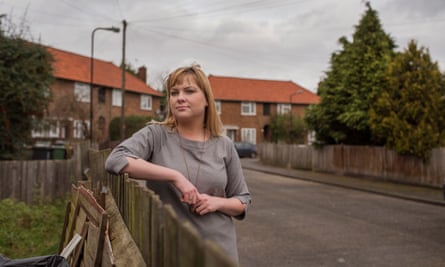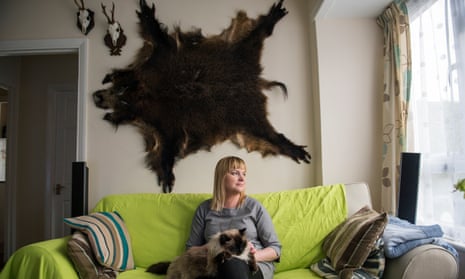A London MP and a group of tenants have condemned a charity set up to help the poor after it sold dozens of flats to a property developer without telling residents, many of whom are now being evicted.
Among those affected is Monika Kojak, who spent eight years renting her flat on the Butterfields estate from the Glasspool Trust, set up 75 years ago with a bequest from a wealthy businessman. She assumed the tenancy was safe, at least until the day she rang the maintenance man to report a boiler problem.
“He said, ‘I can’t help you, you have a new landlord’,” said Kojak. “That was the first I knew. Then the letter came through.”
The letter, which arrived in January, was an eviction notice from a property investment company she had never heard of, giving her two months to quit the property she and her husband had painstakingly renovated. As many as 15 of their neighbours on the Butterfields estate in Walthamstow, north-east London, have received identical notices.
It has now emerged that Glasspool sold 63 properties on two streets to a private company without first informing residents, many of whom live on low incomes or benefits.
The new owners, a recently established property firm known as Butterfields E17 Ltd, have already put some of the flats up for resale, and says it is likely to evict more tenants to sell their homes for a profit.

The charity argues it sold the flats to better finance its core work of giving one-off grants for household items such as fridges. It says it received assurances from the new owners that no one would be evicted, something the property firm vehemently denies.
At the heart of this convoluted tale is the superheated local property market. Prices in Walthamstow have increased 32% in a single year and the Butterfields estate is on the fringes of an area called Walthamstow Village, the epicentre of local gentrification.
Already six of the compact, two-bed flats – which are less than 45 sq metres in size – are up for sale, at prices reaching £350,000, described by estate agents as “a worthy buy-to-let investment”.
No one will tell locals how much their flats were initially sold for, said Kojak, adding “I think this company bought the flats cheaply and wants to make a quick profit”.
The directors of Butterfields E17, listed as Jasbir Singh Jhumat and Pardeep Singh Jhumat, declined to comment. But another staff member told the Guardian they were likely to evict more families and sell their flats in the future, depending on how well the first properties sell.
The local Labour MP, Stella Creasy, told the Guardian: “This is a charity supposed to help people in deprivation. This isn’t particularly charitable, to say the least.”
She said housing is now the most pressing issue on her casework list.
“It also shows the effects of people speculating on property prices,” she added. “We now have people who will either end up on the social housing list, forced out of the borough, or into more expensive poor-quality housing. The council will have to pick up the pieces, one way or another.”
The Butterfields estate, a pair of adjoining streets of purpose-built two-storey 1930s properties, are a good reflection of modern Walthamstow, a once mainly working class suburb transformed over recent decades by successive waves of immigration and then gentrification.
Kojak and her next-door neighbour Magda Krol came to the UK from Poland, while another affected family are NHS workers with two young children originally from the Philippines. Others are Britons, including single parents reliant on benefits.
As Glasspool tenants many enjoyed relatively low rents of about £900 a month, below current market rates of around £1,200, although this was partly offset by the extensive work done by many residents to improve the crumbling properties.
Kojak, a council project manager, said she and her husband, an HGV driver, were angry with Glasspool: “First of all they should have told us. But also I don’t know why they didn’t give us the option to try and buy the flat.”
She said they would miss a close-knit community, including her sister-in-law across the road: “They’ve not been evicted yet, but they’re waiting for the letter. For them it will be a problem. They have two kids and they don’t have a huge income. I know that on this street there are plenty of people on very low incomes, and it will be a disaster to have to move out.”
Krol, who has two sons and is reliant on her husband’s income as a builder, is worried they will need to move some distance to a cheaper area. This would be disruptive for six-year-old Johnny and Gabriel, two, who can only remember living in the flat to which her husband has added wooden floors and a new bathroom.
“We’ve been here five and a half years. The older one is at the local school, and my younger son starts preschool in September. Yesterday after his homework Johnny started saying ‘I don’t want to move, what’s going to happen to my bed and my room?’, and he started to cry. I was trying to tell him not to worry’,” she said.
She also found out about her new landlords by accident: “Before Christmas I called the letting agency to ask her for some help with mould in a cupboard. She told me ‘it’s difficult now you’ve got a got a different landlord’.”
In a statement, Glasspool said it was “very saddened” to learn tenants were being evicted, and that during the sale it sought assurances about this. The spokesman for Butterfields E17 said the company had never been asked about evictions.
Glasspool said the charity was devoted to “helping people out of poverty”, mainly through direct grants.
It said: “In order to be able to provide these grants the trustees realised that they had to sell the charity’s directly held properties to maximise the amount of money the charity could give away. It was a difficult decision to take but the trust was not established as a social housing provider.”











Comments (…)
Sign in or create your Guardian account to join the discussion